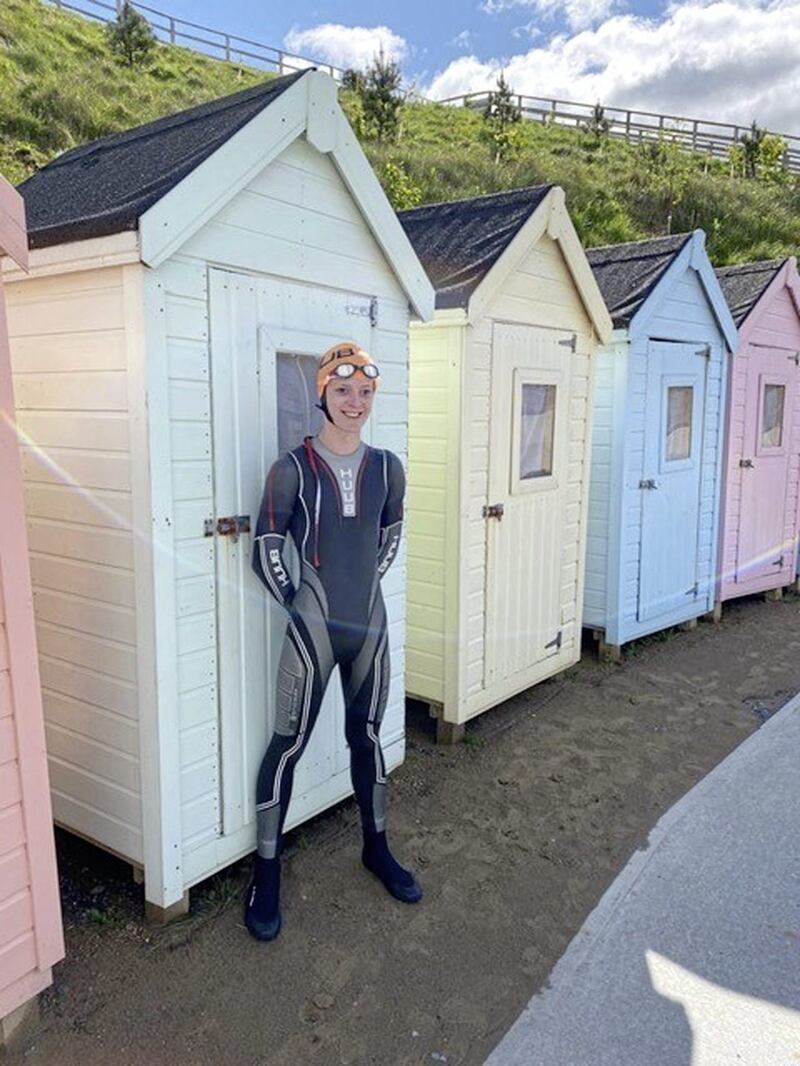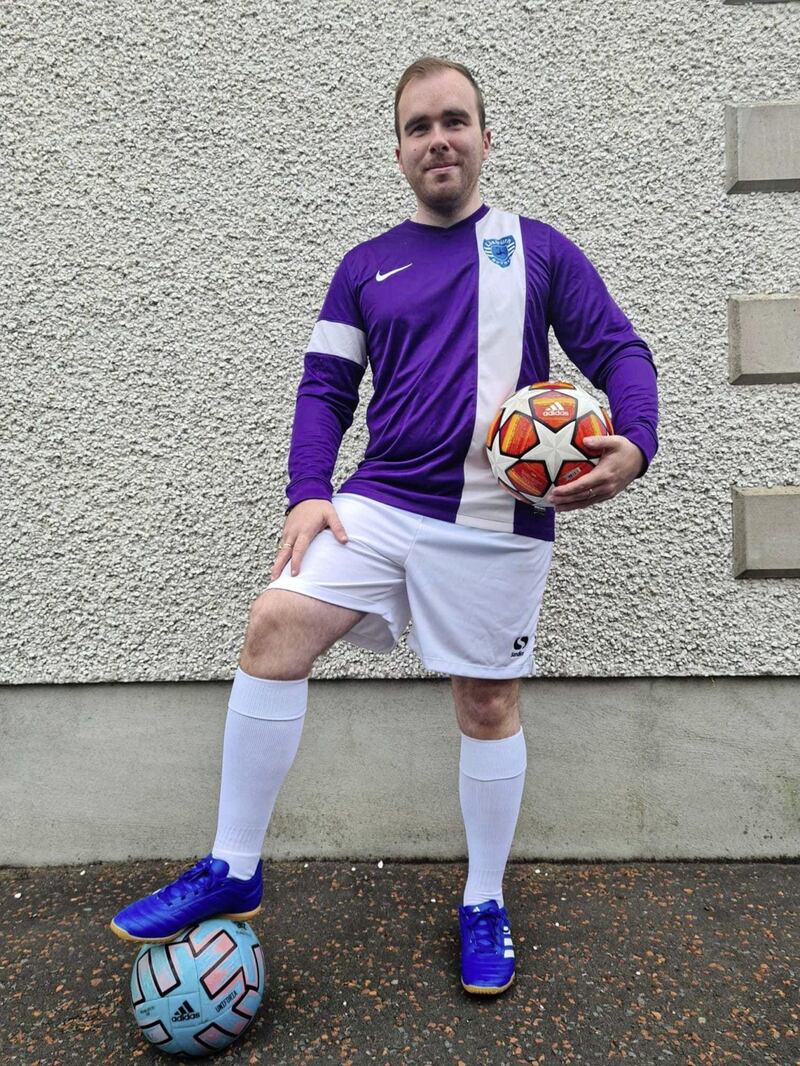AS Paralympic athletes were smashing records and challenging stereotypes in Tokyo last week, the words of local blind runner Tony Barclay perfectly encapsulate the spirit of the games.
"Just open your wings and fly," is the Carrickfergus man's advice to anyone who is visually impaired and thinking of taking up running - or any other sport for that matter.
The 62-year-old, who began losing his sight in his late teens due to a pituitary tumour pressing on his optic nerve, was registered blind at the age of 36 and struggled with the consequences for many years.
However, his life was transformed in 2014 when he signed up for a Couch to 5K programme.
The NHS scheme aims to motivate complete beginners to get moving and run 5km by the end of nine weeks.
After signing up, Tony ran his first marathon just over a year later and his first ultramarathon - a mere 31 miles - the year after that.
Since then, he has become a bit of a legend in local running circles, setting up the group, VI Runners and Guide Runners NI four years ago, to encourage people with sight loss to take up running, and build up a volunteer base to match people with a suitable guide runner.
To date, more than 120 guides have been trained.
He is also currently in the process of setting up the first Couch to 5k group for the visually impaired, in association with the Royal National Institute of Blind People (RNIB), and has been inundated with enquiries from people interested in taking part.
Tony admits he is "completely passionate" about the sport, and equally passionate about helping other people become involved.
It was a different story prior to 2014.
"From the day I was diagnosed with this tumour, I had a little devil whispering on my shoulder, 'You can't do this', and I gave in to that thing for years," he says.
"It took my career away because I had to be medically retired, it took everything away from me. But at the end of Couch, I thought, 'I can actually do this'.
"Then one day, I said to this little devil, 'You see you, you're done', and flicked him off my shoulder and I never looked back."
Tony, who was born in Dublin but grew up in England before moving to Northern Ireland 21 years ago, says visual impairment has one "massive side-effect" that people aren't aware of.
"It's a very, very lonely existence. It's socially very exclusive, people don't know how to deal with you or what to say," he explains.
"As you approach people out on the street, you hear them and they'll see you coming and silence descends, and it happens all the time.
"But the running community is so so welcoming. It doesn't matter that you're different. It has opened up a whole world and the mental health benefits are just immeasurable."
However, as Tony points out, he is only able to run "because of somebody being kind enough to put up with me for whatever number of miles", hence the need for a steady supply of volunteer guides.
The guide running course, delivered by VI Runners and Guide Runners NI, consists of a 20-minute theory video plus a two-hour practical session.
"We have different spectacles which simulate different eye conditions, so people pair up and run a route, usually with a tether, and then they swap. Then they do the same thing with a blindfold," he explains.
"Every single person when they run a hill with a blindfold on says, 'I didn't notice the hill'. They have no awareness of it. It's not just what you can or cannot see. There's a psychological aspect to it as well.
"People who have trained as guides say it has made them look at things and understand them differently."
Tony, who gets around safely thanks to guide dog Wallace and is also trustee for a number of charities, adds: "I have a tattoo on my arm – 'If you believe in yourself, magic will happen' – and that's what we do with Couch.
"I just want to encourage people to have a go and then support them doing it. Just open your wings and fly, you can do it. We're only held back by our own minds."

One young person whose life has taken on a whole new direction thanks, in part, to the help of guides is 17-year-old Oliver Gunning.
Oliver began running five years ago and is now a para triathlete with Triathlon Ireland on their high performance squad.
He has also been nominated by Irish Olympic team, Team Ireland, to compete in some international races.
Such is the Ballyclare teenager's dedication that he trains for more than 14 hours a week and is currently working towards competing in next year's Commonwealth Games. He also has aspirations to qualify for the 2024 Paralympics in Paris.
The lower sixth pupil, who was born with congenital glaucoma and is registered as partially sighted, was among a number of Para competitors in the Mourne Triathlon at the weekend.
"It was great," says Oliver. "It was a sprint triathlon so it was a 750m swim, a 20km bike ride and a 5k run.
"I am tethered to my guide in the water and on the run and we use a tandem bike.
"I have always been a really competitive person, even from I was really young, but as a young child I had that many operations and procedures that I wasn't allowed to do team or contact sports.
"Triathlon has given me the chance to express myself and challenge myself, but safely."

Football, meanwhile, is the preferred sport of Saintfield man Michael Mullan (26), who was born with optic atrophy, or damage to his optic nerve.
At the age of six, he joined a club in Belfast specifically for children with sight loss and for a number of years has been an enthusiastic member of the Lisburn Rovers visually impaired football team, run by the Irish Football Association.
Michael, who mainly plays in defence, has taken part in competitions all over Britain and Ireland and brought back quite a few championship and league titles over the years.
"Even if you don't win, you're meeting new people and getting out and enjoying yourself," says the keen Arsenal supporter.
To help players negotiate the pitch safely, the club uses a yellow ball as well as high contrast cones and bibs while the goal posts are black and white check.
Michael, whose mum and granny were also born with the same eye condition, has been helped since childhood by the RNIB.
"We would have gone on loads of trips and residentials and it helped in trying lots of different things, meeting other people with sight loss and building that confidence in myself," he says.
As a clerical officer with the Housing Executive, he is able to work without any issues thanks to a software programme that reads the print.
"I've been working since I came out of school, and I know other blind or partially sighted people aren't always so fortunate," he adds.
"There are still a lot of misconceptions about being blind or partially sighted. I can do my job just like anyone else.
"The dream is driving, which I can't do, but you just get on with it. Otherwise, I'm your regular 26-year-old ,who just loves football, being with friends and having a laugh."
The RNIB can be contacted on 0303 123 9999 or by emailing helpline@rnib.org.uk. rnib.org.uk/northern-ireland






